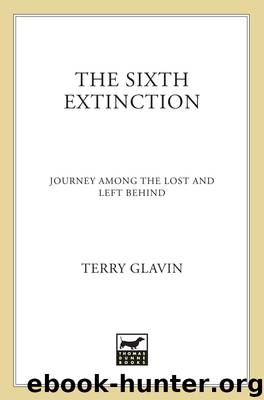The Sixth Extinction by Terry Glavin

Author:Terry Glavin
Language: eng
Format: epub
ISBN: 9781466873582
Publisher: St. Martin's Press
A flower
An Apple Is a Kind of Rose
For the majority of humanity that does not have to watch nature on television but continues to live in rural societies, the distinctions between utility and beauty, between domesticated and wild, are much less clear.
—Pat Mooney
When my three children reached an age suitable for raiding apples from a long-abandoned orchard a short walk through the woods from our house, I did nothing to discourage them. On the island where we live, old orchards were being lost to memory, and I reckoned it was wrong to so blithely dishonour the labour of early island settlers as to let the fruit of their toil rot into the ground. Unharvested food has a smell about it that suggests something far worse than mere theft, and I’m not certain that there isn’t some kind of moral duty involved in raiding fruit trees that have fallen into the possession of absentee landlords.
When my daughter Zoe turned 13, she brought home her first boyfriend and wandered off into the woods with him. It was only when she returned shortly afterward with a bag of apples and an account of how she had put the boy to work in the orchard stealing them that I noticed the sun was still shining in the sky and the birds were still singing in the trees. My sons fell into apple stealing quite naturally. By the time Eamonn was ten and Conall was eight, they were already well accustomed to trundling off through the woods and scaling a rickety fence into the tangled and overgrown orchard to engage in the ancient, righteous, and honourable practice of stealing apples.
One evening, after my boys had returned from the orchard with an especially big bag bursting with fruit, Zoe baked me a pie. It was succulent and sweet and tart and strangely melancholy. I’d never tasted apple pie like it. We were all sitting at the kitchen table, and the kids were eating in an almost reverent silence. I asked the kids, why does the pie taste like this? After a moment, all at once, they said, it’s the apples. They’re different.
It’s hard to explain it, Conall said. Eamonn agreed; they’re just different, he said, and he added that he’d already resolved to stick with the apples he was expropriating from the orchard and to stay away from “disgusting” store-bought apples entirely.
I didn’t know anything about the island’s apples that would have made them “different.” I did know about our tomatoes, though. Mayne Island used to have the largest greenhouse operation in the British empire, more than three hectares under glass, all tomatoes.
The island’s Japanese community had built the greenhouses. The first non-aboriginal settlers were the husbands of local Native women from the Saanich and Cowichan tribes. They were Englishmen and Scots, Germans, Portuguese, and New Brunswickers, and they were good people, farmers, mainly, but the Japanese arrived as successful fishermen, and many were prominent Anglican churchgoers at St. Mary Magdalene. It was only after they got the greenhouses going that the island began to thrive.
Download
This site does not store any files on its server. We only index and link to content provided by other sites. Please contact the content providers to delete copyright contents if any and email us, we'll remove relevant links or contents immediately.
Sapiens: A Brief History of Humankind by Yuval Noah Harari(14389)
The Tidewater Tales by John Barth(12659)
Mastermind: How to Think Like Sherlock Holmes by Maria Konnikova(7347)
The Thirst by Nesbo Jo(6944)
Do No Harm Stories of Life, Death and Brain Surgery by Henry Marsh(6941)
Why We Sleep: Unlocking the Power of Sleep and Dreams by Matthew Walker(6726)
Life 3.0: Being Human in the Age of Artificial Intelligence by Tegmark Max(5558)
Sapiens by Yuval Noah Harari(5372)
The Body: A Guide for Occupants by Bill Bryson(5098)
The Longevity Diet by Valter Longo(5065)
The Rules Do Not Apply by Ariel Levy(4970)
The Immortal Life of Henrietta Lacks by Rebecca Skloot(4589)
Animal Frequency by Melissa Alvarez(4474)
Why We Sleep by Matthew Walker(4447)
The Hacking of the American Mind by Robert H. Lustig(4383)
Yoga Anatomy by Kaminoff Leslie(4363)
All Creatures Great and Small by James Herriot(4323)
Double Down (Diary of a Wimpy Kid Book 11) by Jeff Kinney(4273)
Embedded Programming with Modern C++ Cookbook by Igor Viarheichyk(4182)
